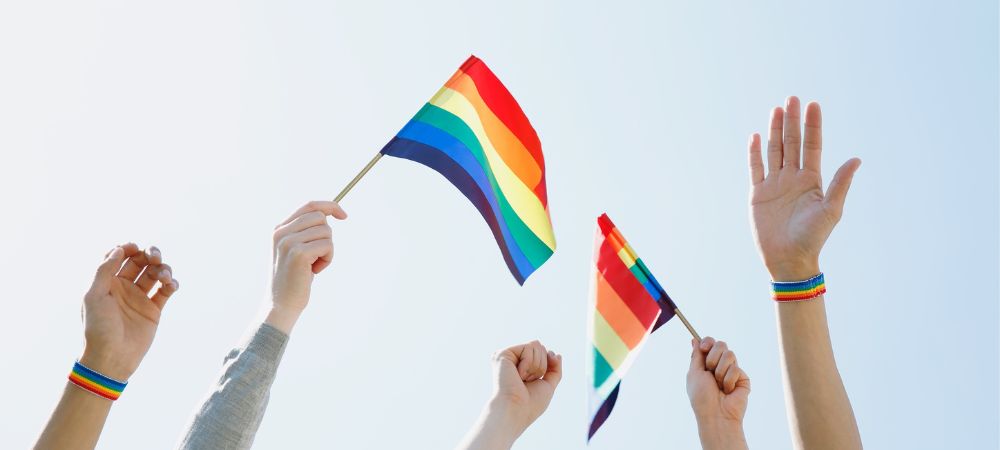
Proud to be me
Ice
June is International Pride Month, as the Pride movement began with the Stonewall riots in June 1969. Today, Pride events are held all year round. Sexual and gender minorities are also, of course, present every day and everywhere.
Queer history
The history of the queer is ultimately very short as we often know it today. The world is still not ready, but a lot has happened since the 1960s, when homosexual acts were still a crime in Finland.
In 1971, the criminalization of homosexual acts was removed from the Finnish Criminal Code, but at the same time the age of consent for homosexual acts was set higher than others. A prohibition on solicitation was also created, according to which public solicitation of same-sex fornication was a punishable act. This of course limited the media's ability to cover homosexuality. Homosexuality was still officially classified as a disease until 1981. The prohibition on solicitation and the different age limits for heterosexual and homosexual sex were only abandoned in 1999.
Changes in legislation and, with it, in human equality are happening and are still needed. The most recent changes, which are significant for many, include the Equal Marriage Act of 2017 and the comprehensive reform of the Transgender Act in 2023.
All kinds of people have always existed, regardless of legislation and representation. However, legislation determines people's possibilities of action and freedom to live their own lives equally and in exactly the way they feel is good for themselves. People also constantly live as part of the world around them. It is difficult to accept yourself as a whole if the world does not accept you.
Creating visibility
I was young myself in the early 2000s when television saw some of the first major attempts to bring homosexual characters into the picture. Bringing sexual minorities onto television brought the minority into the awareness of different people and gave a face to a group of people that they might not have met or known they had met in their everyday lives.
At that time, however, representation could also be thought to have fed stereotypes. In their time, programs like "For the Eyes" were bold and marched a whole bunch of real gays onto the television screen at once , but the audience's perception of the minority remained somewhat narrow through such programs. A real gay man dresses well, takes care of other people's hair and their apartment, and shows how even a straight man can be representative!
Times have changed, and such a gay-straight confrontation may no longer seem relevant today, even though an updated version of the Queer Eye series has been made around the world to this day. However, there is still a lot to be done today, especially in terms of the visibility of sexual minorities, before we reach a situation where a neutral attitude towards people as people has been formed in the media to some extent.
When reading various news stories, it feels like the world needs diversity and understanding of it more than ever right now.
People and letter combinations
Until the early 2000s, sexual and gender minorities were commonly referred to in Finnish with the abbreviation HLBT, which comes from the words gay, lesbian, bisexual and transgender. Today, longer versions of the abbreviation are most often used alongside it, such as HLBTQIA+. Letters have been added to the abbreviation to include queer, intersex and asexuality. The + symbol represents all sexual and gender minorities that are not mentioned.
Every person is different, with their experiences of gender and sexuality. People have been given space to define themselves, and with it the range of gender and sexuality identities and their definitions have expanded. The experiences are not new, but they have been given a name. At the same time, new communities are increasingly being found, especially through the internet and social media.
Community and shared experiences
Often, communities are the reason why people want to find a “compartment” for their own existence. Belonging to a group, shared experiences, and a common history of their own community are truly significant things for many.
When you live in a hetero bubble, your community is almost the entire rest of the world. Sexual or gender minorities are truly minorities who have had to fight and still have to fight for the right to their own existence.
On the other hand, compartmentalization can also be a foreign thing to some people and does not need a special name for its own existence. While sexuality changes for each of us throughout our lives, the experience of gender and the idea of one's own sexual orientation can also change or remain flexible, avoiding compartments.
Sometimes you hear people questioning hetero pride and the right to be just a regular meat-eating straight man. Don't worry, no one is taking that right away, even though there are other ways to be and live.
Let's live and let others live, as our own unique selves.
